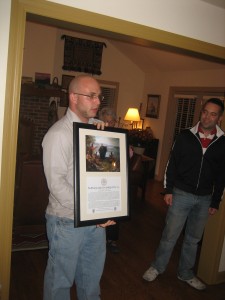Standing up for the Rule of Law
 Hamdan v. Rumsfeld, which concerned the President’s authority to employ military commissions without congressional authorization, is among the most noteworthy of cases to have been decided by the Supreme Court in the last few years. Last month, Professor Stephen Vladeck, who was part of the team that represented Guantanamo detainee Salim Hamdan before the Supreme Court, was part of the law school’s Constitution Day observance. On Wednesday, we have the good fortune to host Lieutenant Commander Charles Swift, who represented Hamdan from the beginning.
Hamdan v. Rumsfeld, which concerned the President’s authority to employ military commissions without congressional authorization, is among the most noteworthy of cases to have been decided by the Supreme Court in the last few years. Last month, Professor Stephen Vladeck, who was part of the team that represented Guantanamo detainee Salim Hamdan before the Supreme Court, was part of the law school’s Constitution Day observance. On Wednesday, we have the good fortune to host Lieutenant Commander Charles Swift, who represented Hamdan from the beginning.
Swift’s presentation promises to be compelling in at least two respects. The first is that Swift will provide a first-hand account of the legal issues surrounding the war on terror via the story of his advocacy for recognition of the rights of Guantanamo detainees. The second concerns the personal cost to Swift of his representation. According to media accounts, Swift understood that the expectation was that he would simply assist Hamdan in entering a guilty plea. But, Swift explained to the Seattle Post-Intelligencer, “I didn’t volunteer for this. I got nominated for it. When I got it, I just decided to do the best I could.” That resulted in a trip to the Supreme Court, in Swift being denied a promotion, and in turn to the end of his military career. As Swift explained to a Bloomberg reporter, “If you start thinking about your career over your duty, it’s time to get out.”
For more information, and to reserve your spot, go here.


 On Wednesday, the Chilean students began their day with Professor Irene Calboli, who spoke to them about the experience of being trained in a civil law tradition only then to work in a common law system. The students also discovered a common interest in patent law and the conversation soon turned to that topic.
On Wednesday, the Chilean students began their day with Professor Irene Calboli, who spoke to them about the experience of being trained in a civil law tradition only then to work in a common law system. The students also discovered a common interest in patent law and the conversation soon turned to that topic.